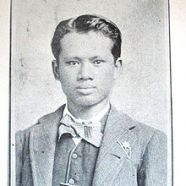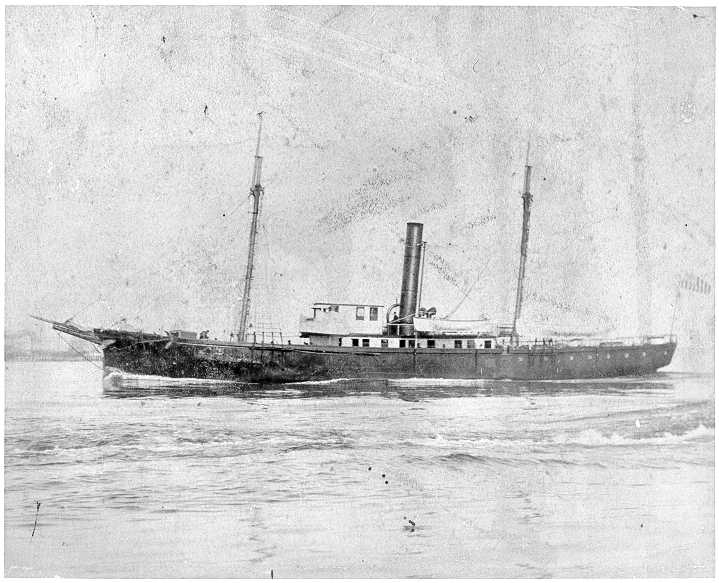A Small Monument at a Small Church about a Big Story
Most people hardly notice a small monument as they walk along Fifth Avenue in Wilmington, North Carolina, and pass by the modestly lovely building of Fifth Avenue Methodist Church.
But if they stopped for just a moment, they would be connected to a little-known but fantastic tale of how an experience of a teenaged Chinese boy on that church site influenced the history of China.
The small granite monument reads: “Charlie Jones Soong, father of the famous Soong family of modern China, was converted to Christianity in the old Fifth Street Methodist Church, which stood on this site. He was baptized on Nov. 7, 1880, by the Rev. T. Page Ricaud, then pastor. One of his six children, Madam Chiang Kai-shek, whose Christian influence is world-wide, is the wife of China’s devout generalissimo and president. Erected in 1944.”
The small monument, a reflection of its times, tells only a small part of the saga of Charlie Soong and his family. And so will the following:
On November 7, 1880, a notice in the local Wilmington Star announced an event that led to the creation of a family dynasty that changed the course of Chinese history: “Fifth Street Methodist Church: This morning the ordinance of Baptism will be administered at this church. A Chinese convert will be one of the subjects of the solemn right [sic], being probably the first ‘Celestial’ that has ever submitted to the ordinance of Baptism in North Carolina. The pastor, Rev. T. Page Ricaud, will officiate.”
The Celestial, as Americans then referred to Chinese people, became known as Charlie Soong, one of China’s wealthiest and most powerful business and political insiders. Soong is better known as the father of the Soong Sisters. One of them, May-ling, we know as Madam Chiang Kai-shek, wife of the leader of the Nationalist Chinese, Chiang Kai-shek, who after being forced from the mainland in 1949 ruled Taiwan until his death in 1975. Madam Chiang lived on until 2003, when she died at age 105.
Another Soong sister, Ching-ling, became Madam Sun Yat-sen, wife of the revolutionary leader recognized as a hero by both Communists and Nationalists.
How Charlie Soong made his way back from Wilmington to China is a story almost as interesting as how he came from China to Wilmington and the Fifth Street Methodist Church. I learned about that tale a few years ago with lots of help from retired New Hanover County librarian Beverly Tetterton and church historian Sue Hammonds.
Sometime between 1863 and 1866, Charlie Soong was born on Hainan, an island off the southeast coast of China. In 1878, after spending time in Indonesia, he traveled to Boston to work at a relative’s shop. The next year he ran away to a U.S. Treasury Revenue Service (forerunner of the Coast Guard) ship Albert Gallatin. He might have been a stowaway at first. But the ship’s captain, Eric Gabrielson, took a liking to him and made him a cabin boy. When Gabrielson was transferred to Wilmington to be the captain of the Schuyler Colfax, another Revenue Service ship, Soong followed. In Wilmington, Gabrielson introduced Soong to Civil War veteran Col. Roger Moore, a devout Methodist, who took Soong to Wilmington’s Methodist churches for services.
At the Fifth Street Church, during the first week in November 1880, Soong heard the powerful preaching of its pastor, Thomas Ricaud, and responded to the altar call at the end of the service. According to Sterling Seagrave, author of The Soong Dynasty, “The whole congregation was riveted by the spectacle of a Celestial bowing at their altar.”
Afterward, Soong told the enthusiastic congregation that he “had found the Savior” and wanted to go back to China as a missionary.
The following Sunday, according to Seagrave, “Dressed in his usual double-breasted Prince Albert frock coat, a conspicuous wig on his bald pate, Reverend Ricaud spread a handkerchief on the step before the altar and knelt in prayer. Then he stood and placed his hands on Charlie’s carefully pomaded black hair. Solemnly, the preacher baptized him ‘Charles Jones Soon.’”
Where the “Charles Jones” came from has many, but no certain, answers. According to one account, when Captain Gabrielson first met Charlie and asked his name, the response was “Chiao-shun,” his Chinese given name. Later Soong added the “g” to his name.
For a short time Ricaud became Soong’s substitute father, seeing to his education and working with Moore to arrange for training to prepare the boy for missionary service. Meanwhile, Soong found work as a printer’s apprentice, an experience that proved to be key when he returned to China.
Moore and Ricaud contacted fellow Methodist Julian Carr, a prominent tobacco and textile manufacturer, to ask for help in paying Soong’s tuition at Trinity College (later Duke University, but then a small Methodist institution in Randolph County).
Carr invited Soong to Durham, where, according to Carr’s biographer, Mena Webb, Soong charmed the Carr family and they took him into their home “not as a servant, but as a son.”
After a year at Trinity, Soong transferred to Vanderbilt to prepare for his return to China in 1886 as an ordained Methodist missionary.
Mission service did not suit Soong. He felt that the crusty, conservative, American Southerners who ran the Methodist missions in China did not treat him fairly or with respect. So he looked for opportunities in business. He knew that there was a shortage of inexpensive Chinese-language Bibles. His experience in the Wilmington print shop gave him the confidence to begin a business printing Bibles. The venture’s success led to other businesses. Their success provided the funds to raise and educate his children and send each of them to the United States for college.
Thanks to his children, Soong’s family influence was felt around the world, especially in China and Taiwan.
The old church building where it all started burned down not long after Soong left Wilmington. The current brick building replaced it in about 1890. Later the church, now known as Fifth Avenue United Methodist Church, added an educational building and named it in honor of Charlie Soong.
* * *
Sun Yat-sen (1866–1925), considered by many to be the founding father of modern China, is honored by both the People’s Republic and the Republic of China on Taiwan. He was a leader in the overthrow of the Qing Dynasty and served as first president of the republican government that succeeded the long line of emperors.
Chiang Kai-shek (1887–1975) was a protégé of Sun Yat-sen. He served as leader of China during World War II and until the defeat of the Nationalist forces by the communists in 1949. After retreating to Taiwan, Chiang ruled there until his death.









Thanks, D.G. Martin, for a fascinating story about a part of North Carolina history I certainly knew nothing about. I was particularly struck by your sentence: “Soong heard the powerful preaching of its pastor, Thomas Ricaud, and responded to the altar call at the end of the service.” We’re so “sophisticated” now (or jaded) about religious experience that we don’t remember how genuine it can be.
Thank you for the detailed story of Mr. Soong. Visited Colonel Roger Moore’s grave at Oakdale Cemetery and learned about little Soong. I have visited his daughter, Soong Ching Ling’s, house in Beijing and had learned about her previously but did not know about her father’s connection to Wilmington. It is amazing to think of the impact his visit had in Wilmington likely had on the modern world.
On February 1, 2023 Dr. Bill Grady presented a bible study on the KJV which included the story of Charlie Soong. He included the importance of 5th Ave. Methodist church then preaching the powerful KJV resulting in salvation of a man and a nation. His daughters, especially Madame Chiang are incredible!
We still do door-to-door evangelism every month. The bible is still powerful!
Sterling Seagrave’s book the “Soong Sisters “is a must read for anyone wanting to make sense of China’ s history as it came to the end of its dynastic heritage, and entered the turmoil of the 20th century.
Yes, the Christians of Wilmington played an important part.